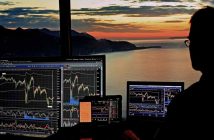The labour market has changed considerably over the course of the last generation, with industries such as manufacturing and fishing having been eschewed as part of a sweeping and ongoing technological evolution.
Concepts such as flexible and remote working have also changed the labour market beyond almost all recognition, while helping to drive a significant increase in the community of self-employed and freelance workers.
This evolution has also helped to open up the financial marketplace, including the lucrative foreign exchange. In fact, many people choose to combine forex trading with their 9-5 job, but is this right for you and what are the key considerations?
Choosing One Option or the Other – The Key Considerations
There may be many instances where you have to choose either committing to a full-time job or trading forex, particularly if your current employment is bound by the terms of a contract.
In this case, your employer may prohibit or restrict certain activities outside of the workplace, particularly if they’re relevant to your job role or may cause a demonstrable conflict of interest.
On a similar note, you may have a time-consuming day job that doesn’t necessarily provide you with huge amounts of disposable income, and in such instances you may find the process of forex trading relatively stressful.
After all, you don’t want to place too many demands on your time or bank balance when you’re attempting to support a family, especially as engaging in the volatile and margin-based forex market may cause you to lose more capital than you can afford.
Conversely, it’s also possible to capitalise on the highly leveraged forex market and earn considerably more than your original deposit, so those of you with significant amounts of disposable income can use this to increase your earning potential and transition to a brand new career.
You may also have enjoyed a successful career in finance, and therefore have the necessary skills and experience to enter the forex market on your own merit. This can enable you to make money for yourself rather than a large corporation, while building a successful and ultimately rewarding career.
When to do Both (and How to do it)
Of course, the latter factors may also encourage you to combine your day job and a career in forex trading, either during an initial transitional period or as a way of optimising your full earning potential.
If you are going to pursue this path, it’s imperative that you proceed with caution while building the skills necessary to operate independently in the forex market.
One way to achieve this is to develop and hone your trading strategies using a demo account, as this offers you access to a simulated, real-time marketplace where you don’t have to risk your hard-earned capital. This can bridge the gap between theoretical knowledge and practical experience, which often makes the difference between success and failure in the marketplace.
It’s also important to identify compatible platforms and mobile trading tools such as the MetaTrader 4, which help you make the most of your limited time and effectively trade from anywhere.
This is great if you intend to track key trends and operate as a prolific day trader, as this will require you to execute a high volume of orders during each 24-hour period.





67 Comments
This is awesome, it’s nice seeing this post here. info
I discovered your blog site site on the search engines and check several of your early posts. https://keeganqrye055.edublogs.org/2022/09/06/20-things-you-should-know-about-search-for-class-action-lawsuits/
I got know your article’s Content and your article skill both are always good. Thanks for sharing this article this content is very significant for me I really appreciate you. https://alexissemp995.postach.io/post/20-resources-that-ll-make-you-better-at-class-action-in-new-york-city
Great article. I love how the way you write this. It’s super entertaining and very knowledgeable. Thank you!
Halifax Roofing Solutions
Great stuff. Looking forward for more of your articles. Enjoyed reading it
Nice blog. I do both since I am WFH.
Mini Excavator Services
Glad to visit this site, I like the information you shard here. https://www.americanheatingandairga.com/
Pretty cool post! This site seemed helpful, thanks for this | https://www.windowcleanersburnaby.com
I do both at the same time! the perks of being work from home!
Home Designer Pros
Nice post! Would love to see more great posts from here. visit us
Nice comparison. Thanks for taking the time to explain both!
Red Deer HVAC
I’ll be happy to have both. https://junkliberty.com
Access to leverage in stock trading is much more heavily regulated. In forex, due to the nature of forex trading, it is more widely accepted. Because of the large sums of currency involved, it would be hard for an average retail trader to trade without leverage. Security fencing
This evolution has also helped to open up the financial marketplace. Go here for more information.
Last generation’s labor economy altered significantly. drift hunters
This guide is so helpful and informative. You also added tips which is like a bonus to an already great article.
I want also to share this https://www.plumberprincegeorge.com/hot-water-heater-repair-and-installations
It’s a very good article. Thanks for the info.
https://dahlcore.com/